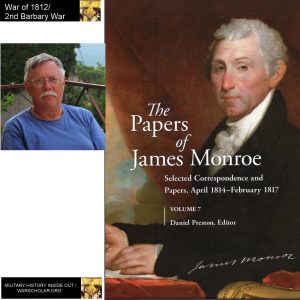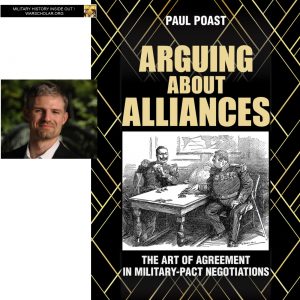Podcast: Play in new window | Download
Subscribe: RSS
 Check out this book here https://amzn.to/3dIM4ok
Check out this book here https://amzn.to/3dIM4ok
Dr. Daniel Preston has spent much of his career compiling and editing the papers of early American Revolution hero and then President James Monroe. We spoke about the latest completed volume of his papers, volume 7, which covers the middle and end of the War of 1812 and then naval expeditions to the North African coast.
1:23 – Dan talks about how he got into studying James Monroe.
2:30 – Dan talks about the War of 1812.
5:16 – Dan talks about US incursions into foreign territory.
6:48 – Dan talks about Monroe’s feelings on the readiness of the US Army in this time.
10:11 – Dan talks about Monroe’s feelings about the War of 1812.
13:20 – Dan talks about what Monroe did as Secretary of War in the fall of 1814.
20:16 – Dan talks about worries that the British would win.
24:58 – Dan talks about the US military and Native Americans.
28:57 – Dan talks about the Native American military threat to the US.
34:37 – Dan talks about the Second Barbary War with Algeria and the South American revolutions.
38:31 – Dan discusses details of the Second Barbary War.
42:14 – Dan talks about the possibility of a US Britain alliance against common enemies.
46:29 – Dan talks about the financial troubles of both the US and Britain and the burning of Washington, DC.
49:56 – Dan goes into detail about the burning of Washington.
51:04 – Dan talks about Monroe’s ideas on defending Washington.
59:43 – Dan talks about the large volume of letters he had to research.
1:02:57 – Dan talks about where the Monroe letters and documents are found.
1:04:35 – Dan talks about President Madison’s cabinet.
1:06:32 – Dan talks about commentaries on the documents
1:09:29 – Dan talks about documents they couldn’t find.
1:10:55 – Dan talks about Monroe’s uncertain birthday.
1:12:43 – Dan’s work and the papers can be found on amazon and on the University of Mary Washington website and by searching “Monroe Papers” or at Academics.umw.edu/jamesmonroepapers.
Links of interest
https://products.abc-clio.com/abc-cliocorporate/product.aspx?pc=B5565C
https://academics.umw.edu/jamesmonroepapers/
For more “Military History Inside Out” please follow me at www.warscholar.org, on Facebook at warscholar, on twitter at Warscholar, on youtube at warscholar1945 and on Instagram @crisalvarezswarscholar. Or subscribe to the podcast on Apple Podcasts | Stitcher | Spotify
Guests: Dan Preston
Host: Cris Alvarez
Tags: military, history, military history, conflict, war, interview, non-fiction book, James Monroe, Jefferson, James Madison, Presidency, Florida, Texas, Virginia, militia, Continental Congress, filibuster, France, Napoleonic Wars, engineers, coastal defenses, British Army, Royal Navy, Chesapeake, Baltimore, Washington, US history, American history, Andrew Jackson, Mobile, New Orleans, Long Island, New England, New York, Henry Dearborn, Canada, Maine, Tennessee Volunteers, Europe, Great Britain, Monroe doctrine, Republicanism, French Revolution, Native Americans, Creeks, Shawnee, Miami, Winnebago, Wyandot, Huron, Algiers War, Spain, Barbary, Libya, Tripoli, Morocco, US Navy, merchant fleet, Mediterranean, American Diplomatic Service, Great Lakes, Michigan, Washington DC, Philadelphia, New York, Patuxent, Alexandria, Stephen Decatur, Oliver Hazard Perry, Library of Congress, New York Public Library, National Archives, Barbary War
Check out this book here https://amzn.to/3dIM4ok
As an Amazon Associate I earn from qualifying purchases.

